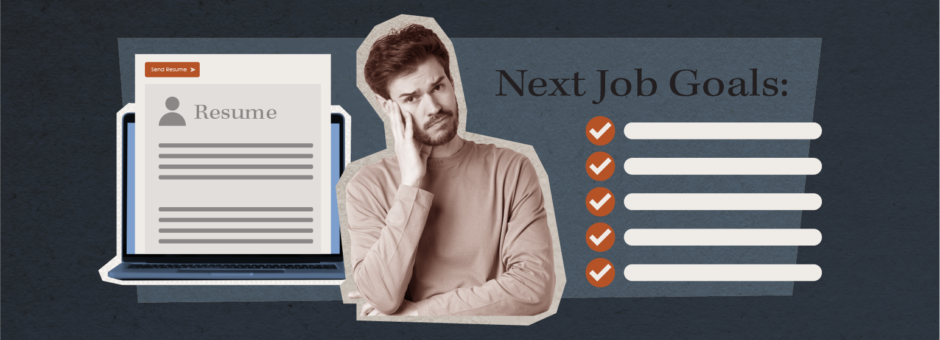Related:
Goldbeck Hits the Airwaves to Offer Advice to Job Seekers
Career transitions are stressful!
Looking for a job is one of the toughest jobs there is. All of the work, none of the pay, served with a healthy side of anxiety and identity loss. To make matters worse, it’s during these tumultuous periods that we often abandon our routine and let chaos reign.
How can we avoid spiraling into a pit of despair? There’s no easy fix, but there are healthy ways to structure your job search and strengthen your resolve. Let’s look at seven ways to stay healthy during periods of uncertainty.
1. Stay Positive and Set Yourself Up for Success
Banging your head against the wall may seem like a good idea, but there’s no job offer in there and you’ll only get a headache. Maybe it sounds trite, but remaining upbeat is the best way to win this battle.
Consider daily affirmations. What made you valuable in previous positions? Write down a list of positive skills and traits you bring to the workforce and read it aloud daily.
Don’t take things personally. There are market forces at play that are beyond your control, and finding the right position is a matter of perseverance.
Steve Jobs was famously released by Apple, only to be rehired. Oprah Winfrey was fired from her first TV gig and Michael Jordan was cut from the high school basketball team. They all did just fine and so will you!
2. Set Realistic Goals and Experience Progress
What’s the goal here? Find a new position that provides purpose, pay, and personal satisfaction on an ongoing basis. This may or may not happen by the end of the day. If not, was today a failure?
No. Focus on metrics that are within your control. Career coach Marlo Lyons suggests breaking your larger goals into smaller pieces.
“Determine the specific period of time you will spend updating your resume, practicing interviewing, researching potential opportunities, and applying to jobs,” she says.1 Incorporate home and personal goals into your planning as well. These victories will give you the boost you need to stay engaged and upbeat throughout your job search.
3. Eat Well and Exercise to Maintain Composure During a Job Search
When Ozzy Osbourne was kicked out of his heavy metal pioneering band Black Sabbath, he turned to drink and drugs eventually recording the classic album Blizzard of Ozz to great fanfare. This is very much the exception, not the rule.
The uncertainties of a career transition can send one heading to the local watering hole for a greasy burger and a beer or six, upending routines, diets, and sleeping schedules. The irony is that during these tumult periods, you are most in need of stability. Stick to a healthy schedule!
“Eating healthy, nutritious foods can help you feel balanced during times of transition,” advises the Mental Health Foundation. “Embracing a diet packed with vitamins and minerals will help to moderate your mood and energy levels throughout the day, giving you the mental bandwidth to navigate this transition.”2
Healthy movement is also a positive. Stretches get the juices flowing. A walk will help you think. Be good to yourself when you need it most.

4. Boost Your Progress with Networking and Support
Networking with professionals in your chosen field not only helps you maintain focus, it might just lead to some valuable connections. At the very least, it will get your creative juices flowing.
The same can be said for job coaches and career counsellors who will help you explore and define your career goals, and provide personalized advice on education, skills development, and job search strategies.
5. Develop a Routine That You Can Sustain
It’s not uncommon for people to push themselves to the limit when searching for a new career. Unfortunately, this just leads to more stress and burnout.
Career strategist Helen Dewar is based out of Vancouver. She advises her clients to pace themselves.
“It’s usually four to nine months before they find an acceptable job, so I ask them to designate a certain number of hours per day to the search, no more than three,” she says. “I also advise them to look at job postings they want, and not sit there for hours scrolling through endless job postings.”3
6. Make Yourself More Valuable Through Continuous Learning
As you look to redefine your career path, why not bolster your employability with some career development? Going back to school or enrolling in seminars can beef up your resume. If formal learning isn’t in the cards, there are still resources for continuous learning right at your fingertips. YouTube is one such avenue. With almost every industry evolving at warp speed, it’s never a bad time to stay current. Doing so will not only make you a better candidate, it will make you feel productive and motivated.
7. Take Care of Yourself
With career and financial uncertainty at play, it may not seem like the right time to treat yourself, but it’s certainly not the occasion to beat yourself up. Set aside time for exercise, hobbies, and reading. Remember: these activities will keep you energized, a necessary ingredient in your ongoing career search.
There’s no way around it: redefining one’s career is a trying period of life. What’s most important to remember is that new and exciting opportunities await in due time. Maintaining healthy habits in the meantime will not only help you have peace of mind, but it will also sharpen your focus and motivation, increasing the likelihood of a successful transition.
Cited Sources
1 Keeping your confidence up during a lengthy job search. Accessed January 7, 2024. https://hbr.org/2023/03/keeping-your-confidence-up-during-a-lengthy-job-search.
2 Hunter, Elana. “How to Establish Better Habits during Major Life Transitions.” Cleveland Health and Wellness Center, October 2, 2021. https://www.chawc.org/blog/establish-better-habits-during-major-life-transitions.
3 Direct communication with Helen Dewar




